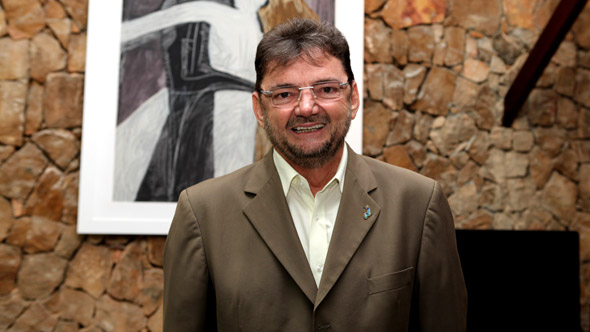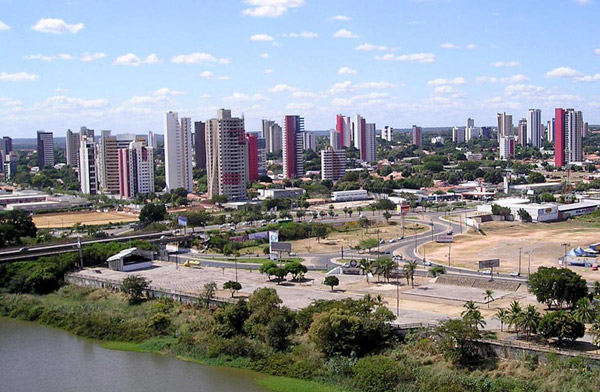Last Great Investment Opportunity in Brazil
Wilson Nunes Martins, Governor of Piauí
Governor Wilson Nunes Martins talks about Piauí and gives an overview of the state. He also talks about some of Piauí’s challenges, great potentials and interesting investment opportunities.
Interview with Wilson Nunes Martins, Governor of Piauí

Piauí is not very well known outside Brazil. Could you present Piauí and tell us about your priorities for the domestic reform?
Piauí has an enormous potential for food production and agro-industry. Besides that, Piauí has a lot of natural resources and opportunities in the mining area, with all the metals and phosphates, gold, diamonds, nickel, iron, etc. that can generate wealth and job opportunities.
Piauí is a state with 252 thousand square meters and 3.2 million inhabitants. It is rich in opportunities. Just to give you an example, Piauí boasts that is has 6 billion hectares of land which is good for agriculture, while 80% of the land is unspoiled and ready to be cultivated. That is why Piauí has an enormous potential for food production and agro-industry. Besides that, Piauí has a lot of natural resources and opportunities in the mining area, with all the metals and phosphates, gold, diamonds, nickel, iron, etc. that can generate wealth and job opportunities.
There is also an enormous opportunity in the tourism sector; not only for the tourism in relation to big events, but also for eco-tourism. We also have 66 km of beaches and the only open sea delta in Latin America.
The Piauí State has excellent federal roads (2500 km) and 5000 km of state roads, which allow good logistics, but we continue to grow. We are investing in railroads in partnership with the Federal Government. Transnordestina represents 400 km of railway in the Piauí state and it goes to 2 other important states: Pernambuco and Ceará. This facilitates the flow of all of our production in terms of minerals and agricultural business.
As a government project, we are investing in an effective way in the processing industry. We have the biggest grain and cotton productivity in Brazil. We have an area of approximately 5 million hectares available, which represents the only available agricultural frontier in Brazil.
Piauí hasn’t yet been able to attract a lot of foreign investment. The majority of that investment goes to São Paulo and to the Federal District. How is the Government in Piauí ready to aggressively attract foreign investment and facilitate operations for these investors?
First of all, we have to assemble infrastructure concerning roads, railways, airports and waterways. Our river, Parnaíba, is 1500 km long and is the longest river in the Northeast of Brazil. Together with the project of growth acceleration, we plan to build a waterway. We are also building the Luís Correia harbour. The results of all this are absolutely positive.
What is necessary is for the big investors to come here after being attracted by the cheap and high quality land that presents positive results in terms of production. We also encourage the processing industry: to plant, harvest and transform it.
We have the best available land in all Brazil in the Cerrado. The terrain is flat, which makes it easier for agricultural mechanization and raises productivity. It also rains regularly over there.
Is this the moment to attract foreign investment?
It is an advantage for imports, but an obstacle for exports. However, I’m sure the government is going to try to keep the real around 1.80 and not let it go to 1.60 because it would be very bad for certain industrial sectors. At 1.80 or 1.85 it would be ideal.
How are you capitalizing on that opportunity?
Today Brazil offers low risk and has a stable politic system: a secure currency, an inflation rate under control and a defined public policy, credit offer and very good workers in Piauí.
As a region, Piauí faces many challenges like the rest of Brazil: the amount of red tape, bureaucracy, the education level of people, etc. There are a lot of challenges to overcome.
What is your personal battle? What is your passion concerning these subjects and how would you like to reform the state?
We are working on the strengthening of the infrastructure by making resources and partnerships viable to build an infrastructure (especially in the logistic area: roads, harbours, airports) which can allow the transport of what is necessary to raise our production.
The Federal and State Universities are helping us a lot in terms of training the work force and ensuring that it is qualified.
Piauí secured a 350 million dollars loan from the World Bank. Half the loan will be used to repay the old debt and the other half will be injected in the infrastructure and education. Can you talk a little bit about this subject?
This loan will be used in a set of actions in health and education, in culture, in sports and also in production and infrastructure.
Are you fully satisfied with the image Piauí has in Brazil and abroad? What are the specific programs you are now working on to build the image of a state that is growing and dynamic – a state that, in the future, will probably be as developed as the other states?
Piauí was always a state that belonged to the poorest region in Brazil. We have one of the lowest GDP in the country, but we are recovering very fast. The Human Development Index, the social development and education are all advancing at a very high pace.

Piauí is the Brazilian state that has grown the most in the last 10 years. That encourages us to continue with an important development project in which there will be investment in all areas, but especially in education. There is a partnership with the Federal Government and thus it is important to transmit that Piauí is a special line of incentives for the Federal Government and the State Government. Here, we have the cheapest money, the most fertile land and the best people with work vocation in Brazil.
We also invest a lot in technical and technological training in the mining area.
According to geotechnical, geophysical, aerogeophysical and seismic tests, we have a lot more gas here in the basin of the river Parnaíba than in Bolivia. We are very optimistic with the wealth perspectives of the Piauí state and with what we can offer to the world as investment opportunities.
80% of our agricultural land is still unused and one of the world’s problems in the future will be food production. Our land, as I’ve said, is flat, fertile and rained on regularly, so there is no better place in the world today for investment.
You are considered a workaholic. What is it that keeps you going and fighting?
I wake up every morning with the will to work and solve problems.
I was born in a small village that had no electricity, no water, no schools, nothing. The families were farmers living rustically. We fought a lot to get where we are today and we experienced what it was like to have no future with each morning that came. Today, since I have the chance to be the State Governor, I work very hard to obtain a definitive solution for all men, women and children in Piauí.